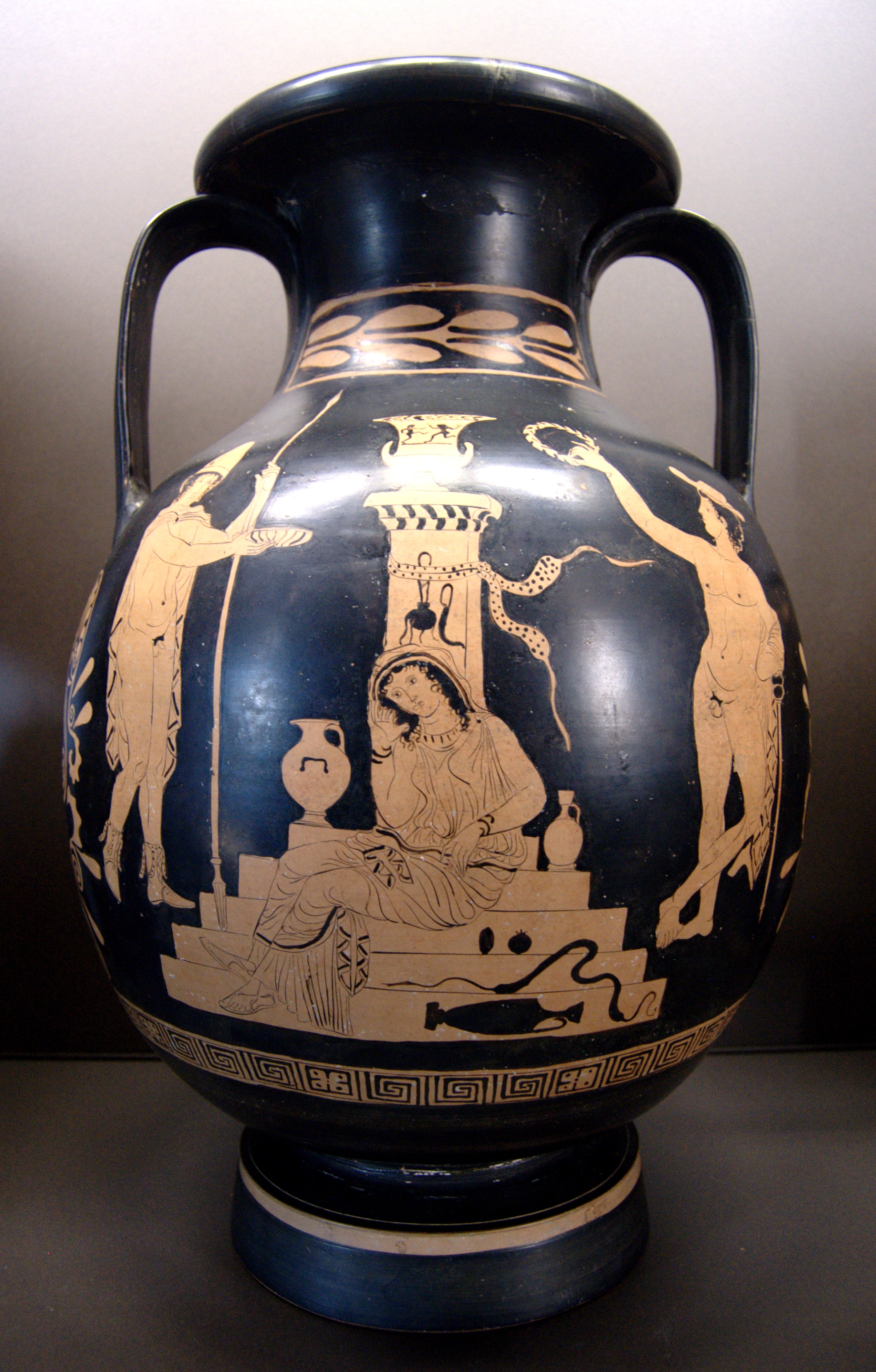- Electra (Euripides)
caption = "Orestes, Electra and Hermes in front of Agamemnon's tomb" by Choephoroi Painter
writer =Euripides
chorus =Argive women
characters =Electra
OrestesClytemnestra
Castor
Electra's husband
servants
mute =Pylades
Polydeuces
setting = Argos, at the house of Electra's husbandEuripides ' "Electra" was probably written in the mid 410s BC, likely after413 BC . It is unclear whether it was first produced before or afterSophocles ' version of theElectra story.Background
Years before, near the start of the
Trojan War , the Greek generalAgamemnon sacrificed his daughterIphigeneia in order to appease the goddessArtemis and allow the Greek army to set sail forTroy . His wife Clytemnestra never forgave him, and when he returned from the war ten years later, she and her loverAegisthus murdered Agamemnon.Their daughter Electra was married off to a farmer, amidst fears that if she remained in the royal household and wed a nobleman, their children would be more likely to try to avenge Agamemnon's death. Although the man is kind to her and has taken advantage of neither her family name nor her
virginity , Electra resents being cast out of her house and her mother's loyalty toAegisthus . Agamemnon and Clytemnestra's son, Orestes, was taken out of the country and put under the care of the king ofPhocis , where he became friends with the king's sonPylades .Plot
Now grown,
Orestes and his companionPylades travel toArgos , hoping for revenge, and end up at the house of Electra and her husband. They have concealed their identities in order to get information, claiming that they are messengers from Orestes, but the aged servant who smuggled Orestes off to Phocis years before recognizes him by a scar, and the siblings are reunited. Electra is eager to help her brother in bringing down Clytemnestra and Aegisthus, and they conspire together.While the old servant goes to lure
Clytemnestra to Electra's house by telling her that her daughter has had a baby, Orestes sets off and kills Aegisthus and returns with the body. His resolve begins to waver at the prospect of matricide but Electra coaxes him into going through with it. When Clytemnestra arrives, he and Electra kill her by pushing a sword down her throat (which is only recounted and not shown), leaving both feeling oppressive guilt. At the end, Clytemnestra's deified brothersCastor andPolydeuces (often called the "Dioscuri ") appear. They tellElectra andOrestes that their mother received just punishment but that their matricide was still a shameful act, and they instruct the siblings on what they must do to atone and purge their souls of the crime.Aeschylean parody and Homeric allusion
The enduring popularity of
Aeschylus ' "Oresteia " trilogy (produced in 458) is evident in Euripides' construction of the recognition scene between Orestes and Electra. In "The Libation Bearers " (whose plot is roughly equivalent to the events in the "Electra"), Electra recognizes her brother by a series of tokens: a lock of his hair, a footprint he leaves at Agamemnon's grave, and an article of clothing she had made for him years earlier. Euripides' own recognition scene clearly parodies Aeschylus' account. In Euripides' play (510ff.), Electra laughs at the idea of using such tokens to recognize her brother because: there is no reason their hair should match; Orestes' footprint would in no way resemble her smaller footprint; and it would be illogical for a grown Orestes to still have a piece of clothing made for him when he was a small child.Orestes is instead recognized from a scar he received on the forehead while chasing a doe in the house as a child (571-74). This is a mock-heroic allusion to a scene from
Homer 's "Odyssey ". In "Odyssey" 19.428-54, the nurse Eurycleia recognizes a newly returned Odysseus from a scar on his thigh that he received as a child while on his first boar hunt. In the "Odyssey", Orestes' return to Argos and taking revenge for his father's death is held up several times as a model for Telemachus' behavior (see "Telemachy "). Euripides in turn uses his recognition scene to allude to the one in "Odyssey" 19. Instead of an epic heroicboar hunt , Euripides instead invents a semi-comic incident involving afawn . [See (e.g.) Solmsen 1967; Tarkow 1981; Halporn 1983. For a general study of allusions to Homer in Greek tragedy, see Garner 1990.]Notes
References
Garner, R. "From Homer to Tragedy: The Art of Illusion in Greek Poetry" (London 1990).
Solmsen, F. "Electra and Orestes: Three Recognitions in Greek Tragedy" (Amsterdam 1967).
Tarkow, T. "The Scar of Orestes: Observations on a Euripidean Innovation," "Rheinisches Museum" 124 (1981) 143-53.Translations
*
Edward P. Coleridge , 1891 - prose: [http://www.perseus.tufts.edu/cgi-bin/ptext?lookup=Eur.+El.+1 full text]
*Gilbert Murray , 1911 - verse
*Aurthur S. Way , 1912 - verse
*Emily Townsend Vermeule , 1958 - verse
*J. Davie , 1998
*J. Morwood , 1998
*G.Theodoridis , "Elektra", 2006 - Full Text, prose: [http://bacchicstage.com/]
Wikimedia Foundation. 2010.

